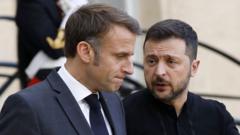As tensions escalate, Israel's stance on the upcoming hostage exchanges reveals deeper issues at play behind the ongoing cease-fire and negotiations between Hamas and Israel.
Gaza Cease-Fire Stalemate: Netanyahu Issues Ultimatum to Hamas

Gaza Cease-Fire Stalemate: Netanyahu Issues Ultimatum to Hamas
The fragile cease-fire in the Gaza region faces uncertainty as Israeli Prime Minister Benjamin Netanyahu threatens renewed military action amidst postponed hostage negotiations by Hamas.
The fragile peace in Gaza is increasingly at risk as Israeli Prime Minister Benjamin Netanyahu delivers a stark warning to Hamas regarding the postponement of hostage releases. Following Hamas's announcement of an indefinite delay in releasing hostages, Netanyahu asserted that any failure to proceed as scheduled could lead to a resumption of “intense fighting” by Israeli forces.
The Israeli leader’s remarks were underscored by a parallel demand from President Trump, who urged that all remaining hostages be released by the deadline of Saturday noon, or face dire consequences. Notably, Israel's requirement pertains only to three specific captives, as mandated by the truce agreement.
In addition to delivering his ultimatum, Netanyahu instructed a strengthening of military presence around Gaza, though he refrained from indicating plans to reclaim territories Israel had recently evacuated. He stated, “This operation is currently underway... We will complete it as soon as possible.”
Despite the increasing tensions, analysts suggest that a last-minute compromise could still be feasible before the proposed release schedule. However, looming deadlines in March threaten to complicate matters further, where the existing cease-fire is set to expire unless new negotiations yield an extension.
Ibrahim Dalalsha, a political analyst at the Horizon Center in Ramallah, foresees this current crisis set against the backdrop of an impending and possibly larger conflict as the March deadline approaches. The situation remains fluid, potentially shifting based on the negotiations and political maneuvers of both sides as they navigate the precarious path towards stability in Gaza.
The Israeli leader’s remarks were underscored by a parallel demand from President Trump, who urged that all remaining hostages be released by the deadline of Saturday noon, or face dire consequences. Notably, Israel's requirement pertains only to three specific captives, as mandated by the truce agreement.
In addition to delivering his ultimatum, Netanyahu instructed a strengthening of military presence around Gaza, though he refrained from indicating plans to reclaim territories Israel had recently evacuated. He stated, “This operation is currently underway... We will complete it as soon as possible.”
Despite the increasing tensions, analysts suggest that a last-minute compromise could still be feasible before the proposed release schedule. However, looming deadlines in March threaten to complicate matters further, where the existing cease-fire is set to expire unless new negotiations yield an extension.
Ibrahim Dalalsha, a political analyst at the Horizon Center in Ramallah, foresees this current crisis set against the backdrop of an impending and possibly larger conflict as the March deadline approaches. The situation remains fluid, potentially shifting based on the negotiations and political maneuvers of both sides as they navigate the precarious path towards stability in Gaza.





















